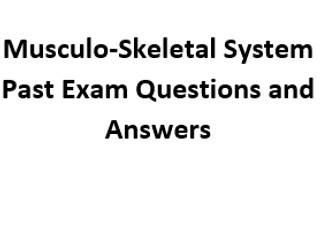AQA Knowledge Organisers for GCSE PE
<p>AQA GCSE PE knowledge organisers (TOPIC ON A PAGE). Each A4 sheet (some topics are 2 sheets) contains all the key information for each topic to help students revision. The sheets are designed to be enlarged to A3.</p>
undefined
Warm-up and Cool down Questions for GCSE PE
<p>Past exam questions and answers from around the world on warm-ups and cool downs. There are:</p>
<ul>
<li>10 multiple choice questions</li>
<li>21 basic (1-5 mark) questions</li>
<li>2 extended writing (6 or 9 mark) questions</li>
</ul>
<p>The questions cover the following topics:</p>
<ul>
<li>The correct process of a warm-up and cool down</li>
<li>Reasons for warm-ups and cool downs</li>
</ul>
Principles of Training Questions for GCSE PE
<p>Past exam questions and answers from around the world on the principles of training. There are:</p>
<ul>
<li>28 multiple choice questions</li>
<li>36 Basic (1-5 mark) questions</li>
<li>2 extended writing (6 or 9 mark) questions</li>
</ul>
<p>The questions cover the following topics:</p>
<ul>
<li>Specificity</li>
<li>Progressive Overload</li>
<li>Reversibility</li>
<li>Tedium</li>
<li>FITT</li>
<li>Training zones</li>
</ul>
Respiratory System Questions for GCSE PE
<p>Past exam questions and answers from around the world on the Respiratory system. There are:</p>
<p>22 multiple choice questions<br />
41 basic (1-5 mark) questions<br />
1 extended writing (6 or 9 mark) question</p>
<p>The following topics are cover by the questions:</p>
<ul>
<li>Structure and function of the respiratory system</li>
<li>Mechanics of inspiration and expiration (breathing in and out)</li>
<li>Spirometer traces</li>
</ul>
Movement Analysis Questions for GCSE PE
<p>Past exam questions and answers on planes, axis and levers. There are:</p>
<ul>
<li>21 multiple choice questions</li>
<li>30 basic (1-5 mark) questions</li>
</ul>
<p>The following topics are cover by the questions:</p>
<ul>
<li>Planes and Axis</li>
<li>Levers</li>
<li>Mechanical advantages of levers</li>
</ul>
Diet and Nutrition Questions for GCSE PE
<p>Past exam questions and answers from around the world on diet and nutrition. There are:</p>
<p>20 multiple choice questions<br />
53 basic (1-5 mark) questions<br />
3 extended writing (6 or 9 mark) questions</p>
<p>The questions cover the following topics:</p>
<ul>
<li>Macronutrients (Carbohydrates, Fats and Proteins)</li>
<li>Micronutrients (Vitamins and Minerals)</li>
<li>Water and Fibre</li>
<li>A balanced diet</li>
<li>Calories / energy balance</li>
<li>Sporting diets / requirements</li>
</ul>
Feedback and Guidance Questions for GCSE PE
<p>Past exam questions and answers from around the world on guidance and feedback. There are:</p>
<p>18 multiple choice questions<br />
28 basic (1-5 mark) questions<br />
2 extended writing (6 or 9 mark) questions</p>
<p>The questions cover the following topics:</p>
<ul>
<li>Visual, verbal, manual and mechanical guidance</li>
<li>The types of guidance best suited to beginners and experts</li>
<li>Positive, Negative, Intrinsic and Extrinsic Feedback</li>
<li>Knowledge of Results and Performance</li>
<li>The types of feedback best suited to beginners and experts</li>
</ul>
Aerobic and Anaerobic Questions for GCSE PE
<p>Past exam questions and answers on aerobic and anaerobic energy systems. There are:</p>
<p>10 multiple choice questions<br />
23 basic questions</p>
<p>The following topics are cover by the questions:</p>
<ul>
<li>Aerobic energy system</li>
<li>Anaerobic energy system</li>
</ul>
Components of Fitness Questions for GCSE PE
<p>Past exam questions and answers on components of fitness There are:</p>
<p>22 multiple choice questions<br />
58 basic questions<br />
4 extended writing questions</p>
<p>The following topics are cover by the questions:</p>
<ul>
<li>Definitions of components of fitness</li>
<li>Linking components of fitness to different sporting situations</li>
</ul>
Arousal and Controlling Arousal Questions for GCSE PE
<p>Past exam questions and answers from around the world on arousal and how to control arousal. There are:</p>
<ul>
<li>12 multiply choice questions</li>
<li>21 Basic (1-5 mark) questions</li>
<li>2 extended writing (6 or 9 mark) questions</li>
</ul>
<p>The questions cover the following topics:</p>
<ul>
<li>Different types of arousal</li>
<li>Affects of arousal on performance</li>
<li>How to control arousal</li>
</ul>
Classification of Skill Questions for GCSE PE
<p>Past exam questions and answers from around the world on the classification of skills. There are:</p>
<p>21 multiple choice questions<br />
27 basic (1 - 5 mark) questions</p>
<p>The questions cover the following topics:</p>
<ul>
<li>Open and closed skills</li>
<li>Simple / Basic and Complex skills</li>
<li>Self paced and externally paced skills</li>
<li>Fine and Gross skills</li>
</ul>
Circulatory System Questions for GCSE PE
<p>Past exam questions and answers on the ‘Circulatory’ system. There are:</p>
<p>21 multiple choice questions<br />
44 basic questions</p>
<p>The following topics are cover by the questions:</p>
<ul>
<li>Function and structure of the heart</li>
<li>Function and structure of blood vessels</li>
<li>Vasodilation and Vasconstriction</li>
</ul>
Fitness Testing Questions for GCSE PE
<p>Past exam questions and answers on fitness testing. There are:</p>
<p>21 multiple choice questions<br />
38 basic questions<br />
1 extended writing question</p>
<p>The following topics are cover by the questions:</p>
<ul>
<li>The different types of fitness tests</li>
<li>The reasons for fitness testing</li>
<li>The limitations of fitness testing</li>
</ul>
Training Methods Questions for GCSE PE
<p>Past exam questions and answers on training methods. There are:</p>
<p>32 multiple choice questions<br />
69 basic questions<br />
8 extended writing questions</p>
<p>The following topics are cover by the questions:</p>
<ul>
<li>Types of training including altitude training</li>
<li>Training seasons</li>
</ul>
Musculo-skeletal Questions for GCSE PE
<p>Past exam questions and answers on the ‘Musculo-skeletal’ system. There are:</p>
<ul>
<li>54 multiple choice questions</li>
<li>103 basic questions</li>
<li>1 extended writing question</li>
</ul>
<p>The following topics are cover by the questions:</p>
<ul>
<li>Muscular system</li>
<li>Function of the skeletal system</li>
<li>Joints within the skeletal system</li>
</ul>
Effects of Exercise on the Body Questions for GCSE PE
<p>Past exam questions and answers from around the world on the effects of exercise on the body. There are:</p>
<p>25 multiple choice questions<br />
54 basic (1 - 5 mark) questions<br />
2 extended writing (6 - 9 mark) questions</p>
<p>The questions cover the following topics:</p>
<ul>
<li>The immediate effects of exercise on the circulatory, respiratory and muscular systems</li>
<li>The short term effects of exercise on the body</li>
<li>The long term effects of exercise on the circulatory, respiratory, muscular and skeletal systems</li>
</ul>
